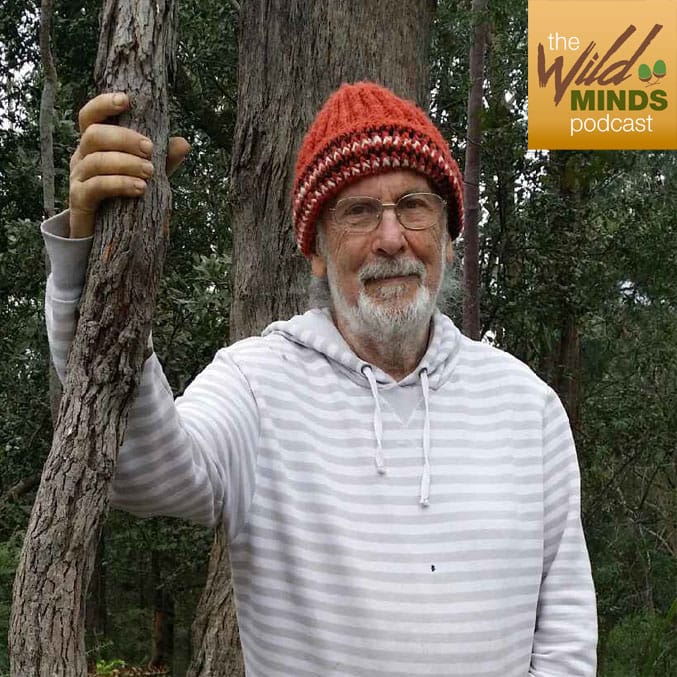
Episode 61:
Deep Ecology & the Healing of Separation
Guest: John Seed
Share:

Hosted by: Marina Robb

John Seed
In this episode of Wild Minds, I’m honoured to be in conversation with John Seed — a true elder of the environmental movement and one of the most influential voices in deep ecology. He influenced my own journey into environmental education in the late 1980’s so it was a real privilege of sharing this conversation with him.
Once a child refugee and IBM systems engineer, John’s life took a radical turn when he became a frontline activist in the global rainforest protection movement. He founded the Rainforest Information Centre in 1979 and has since led hundreds of campaigns across continents, helping to safeguard some of the Earth’s most threatened ecosystems. In recognition of his contributions, he was awarded the Order of Australia Medal for services to conservation and the environment.
John is also a filmmaker, songwriter, sculptor, and co-author of Thinking Like a Mountain. In the 1990s, he partnered with systems thinker Joanna Macy to co-create and facilitate Deep Ecology workshops—experiential spaces that help us reconnect with the living Earth and reclaim our ecological identity. As awareness of the climate and ecological crisis grows, John’s work has become more vital than ever.
In our conversation, we explore how deep ecology offers not just ideas, but a powerful shift in perception and practice—a way to remember our place in the web of life and to respond from a place of connection rather than fear or despair. This episode is an invitation to explore why deep ecology matters now, and how it can reawaken the felt sense that we are nature, not separate from it.
In this episode, we dive into:
- Every culture has historically gathered, through rituals and ceremonies to remember and honour all our relations. This is not just a feature of modernity — it reflects something essential about being human. As “holy amnesiacs,” we need ways to reconnect, and experiential deep ecology offers such a pathway.
- Indigenous practices are not just cultural expressions; they are vital reminders and tools for sustaining connection with the living world.
- Young children often perceive the world as fully alive — we’re born with this awareness but are quickly socialised out of it by cultural norms.
- What’s required is a fundamental transformation in human consciousness.
- When people come together with a shared intention to heal the illusion of separation between humans and nature, profound shifts can happen.
- Intention itself is powerful — any practice that aligns with it becomes a vehicle for reconnection. Letting go of human exceptionalism and arrogance is key.
- We are inherently ecological beings — every atom in our bodies connects us to the Earth and the stars.
- Deep ecology provides one vital response to the ecological and existential crisis we face.
- The phrase “thinking like a mountain” expresses a shift from “I am protecting the rainforest” to “I am part of the rainforest protecting itself.”
- Acts of activism can serve as deep ecology ceremonies — identity-shifting experiences of connection.
- Human beings are just one among billions of species. Our intelligence is a small flower on the vast evolutionary tree.
- The question becomes: how do we feel ourselves as part of a rainforest, a river, a living Earth?
- Our feelings are a form of ancient intelligence. In deep ecology work, we move from gratitude into honouring our pain for the world — inviting grief, rage, fear, and despair.
- These feelings are not dangerous — they are human. When safely expressed, they create healing. Suppression, however, leads to suffering.
- The Cosmic Walk, based on the work of Thomas Berry and Sister Miriam Therese MacGillis, is a ritual that reawakens our place in the 13.7-billion-year story of the universe.
- From the level of our ecological identity, we realise we are all of it. This expanded sense of self transforms how we relate to life and wellbeing.
- The dominant culture pathologises feelings, seeing them as symptoms to be managed rather than wisdom to be heard.
- The “self” modern psychology tries to fix is often a social fiction. Only real, living things can truly heal - and they often self-heal.
- If we were educated through the lens of the story of the universe, we might perceive economics, religion, and culture very differently.
- Economics can be seen as a religion — based on bizarre assumptions like infinite growth on a finite planet — sustained by advertising as its form of religious education.
- Studies show that problems are more easily solved in groups than by individuals. We are social mammals, built for dialogue and collaboration.
- We need not just individuals who are reconnected, but whole cultures of connection.
- Finding a way forward depends on nurturing community and shared intention.
- Spend time in wild nature. Seek out — or create — experiences of deep ecology. Don’t wait. Just begin. Start where you are.
Music by Geoff Robb: www.geoffrobb.com
Links
|
Resources
|


